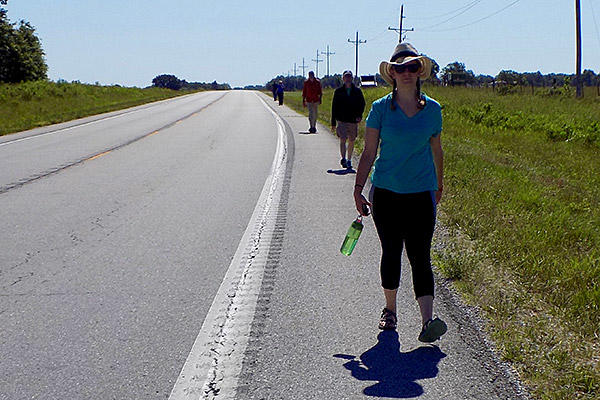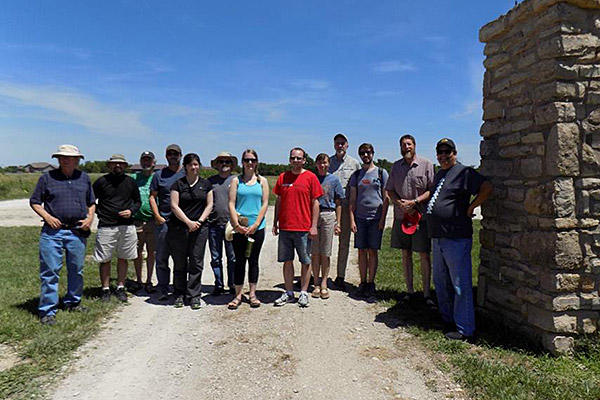Decolonization and Discipleship
HTE576: Three credit hours
Summer Intensive Course: June 14–25, 2021
Due to the COVID-19 pandemic, this on-campus course is being offered in place of the Trail of Death pilgrimage in 2021. (We hope to offer the pilgrimage again in 2023.) This course will meet in person on the AMBS campus with a few short trips to locations in the surrounding area. COVID-19 safety protocols will be in place for class meetings and local travel. More details will be shared as the course term approaches.
This course will explore the spiritual, ecological, and socio-political dimensions of decolonization as a process of inner and outer transformation. Students will learn about the ongoing impacts of settler colonialism under the Doctrine of [Christian] Discovery in what is now the U.S. and will consider reparative responses in light of Jesus’ call to Jubilee justice.
We will focus on two narrative loci for deeper engagement with the Doctrine of Discovery: 1) students’ family stories of connection or disconnection with land; and 2) the stories of Potawatomi Nations with ancestral ties to land in northern Indiana.
During the course, students can expect to:
- Walk for a day of remembrance and lament on the route of the Trail of Death, the forced removal of over 850 Potawatomi people in 1838
- Learn from guest speakers, such as historians, Potawatomi teachers, and other practitioners
- Identify and begin a “decolonizing practice” of discipleship that addresses the harms done under colonialism in a reparative way
- Learn from decolonial theory and a range of Indigenous perspectives
- Engage head, heart and hands through research, prayer, ritual, and movement
Questions? Please contact Katerina Friesen, Sessional Faculty.
Course instructor (June 14–25, 2021)
Katerina Friesen, Sessional Instructor, lives on Yokut land in Fresno, California. Her work centers around healing from the violence of structural sin. During her time as a student at AMBS (MDiv 2016), she created a curriculum for Anabaptist congregations about the Doctrine of Discovery, which accompanies a documentary film available on the Dismantling the Doctrine of Discovery Coalition website. Read more about Katerina on her Sessional Faculty page.

Pilgrimage participant feedback
"At the beginning of the pilgrimage, I was compelled to feel sympathy for the Potawatomi people. But the more reading we did, the more we heard from Native peoples, the more I realized that they are survivors, a strong and courageous community. Rather than seeing them as victims, I saw them as my teachers." — Amy Kratzer, Associate Pastor, Sunnyside Mennonite Church, 2015 participant
"The Trail of Death pilgrimage was an incredibly relevant, informative and life-transforming experience. Through this experiential learning journey, we developed a lens into the ways in which United States citizens, political representatives, and churches participated in the past, present and future exploitation of American Indian people. We also developed ways in which we can, and must, be an active part of ending these oppressive systems and structures of exploitation." — Grant Swanson, Garrett-Evangelical Theological Seminary student, 2017 participant

Course information
- Dates: June 14–25, 2021; 8:30–11:30 a.m. Mon–Fri
- Registration deadline: May 24, 2021
What is the Trail of Death?
The Potawatomi Trail of Death was the forced removal of the Potawatomi Indians from north central Indiana to eastern Kansas in the fall of 1838. Read more. See also the series of maps created by Shirley Willard, Eric and Susan Campbell, and George Godfrey, with help from Rich Meyer.
Credit or audit
Participants may earn three credit hours of graduate study or take the course as auditors. Credit also may be transferred to other ATS schools.
Costs
Course for credit: $1,700
Course for audit: $488
The costs above include three credit hours of tuition, a $20/credit hour student services fee and a $50 Decolonization and Discipleship course fee. (Please note: Nonadmitted students will need to bring the $50 course fee with them when they arrive on campus.)

Suggested readings
- Benjamin Petit Letters and Journal
- Braiding Sweetgrass by Robin Wall Kimmerer
- An Indigenous Peoples' History of the United States by Roxanne Dunbar Ortiz
- The Land is Not Empty by Sarah Augustine
- Native by Kaitlin Curtice
- Healing Haunted Histories by Elaine Enns and Ched Myers
Related information
- George Godfrey Writings
- Indigenous Lands Map - Whose land are you on?
- Doctrine of Discovery: In the Name of Christ
- Dismantling the Doctrine of Discovery Coalition

Mennonite Central Committee Great Lakes is a sponsor of the Trail of Death Pilgrimage course.
